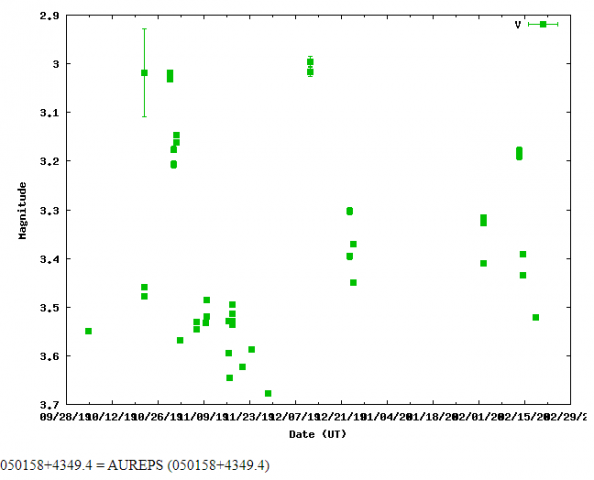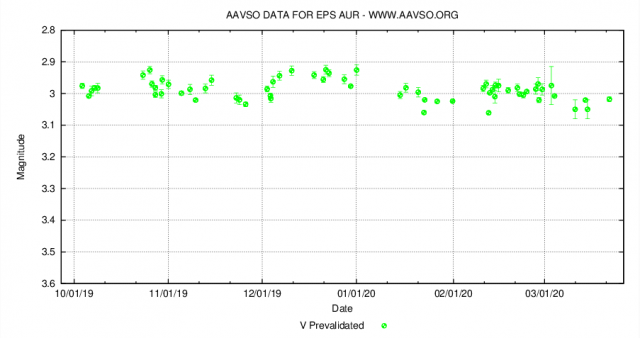› Forums › General Discussion › Whatever happened to Megrez?
- This topic has 33 replies, 9 voices, and was last updated 5 years, 10 months ago by
 Tracie Heywood.
Tracie Heywood.
-
AuthorPosts
-
28 March 2020 at 6:55 pm #582171
 Alan ThomasParticipant
Alan ThomasParticipantThanks Jeremy!
28 March 2020 at 7:29 pm #582172 Chris DoleParticipant
Chris DoleParticipantHello all.
Just to add that a look upwards last night from my fairly light polluted location revealed Megrez to be ‘missing’. If I looked a little longer I could just about make it out. This has never been the case in the past and the familiar pattern has always been obvious.
Chris.
28 March 2020 at 7:53 pm #582173 Nick WhiteParticipant
Nick WhiteParticipantWhat is the reason for the scepticism about the V-band measurements? Is the scatter not similar to AAVSO visual data, albeit for a different frequency of observation? Either way, a few days of continued observation should resolve the matter, should it not?
28 March 2020 at 8:30 pm #582175 Alan ThomasParticipant
Alan ThomasParticipantNaked eye observation at 20.26. Megrez not visible.
28 March 2020 at 9:04 pm #582177 Robin LeadbeaterParticipant28 March 2020 at 9:49 pm #582178
Robin LeadbeaterParticipant28 March 2020 at 9:49 pm #582178 Nick WhiteParticipant
Nick WhiteParticipantThanks Robin, I see your point now! Cheers.
28 March 2020 at 10:05 pm #582179 Alan ThomasParticipant
Alan ThomasParticipantNaked eye observation 21.59. Megrez barely visible.
28 March 2020 at 10:57 pm #582180 Alan ThomasParticipant
Alan ThomasParticipantNaked eye observation 22.50. Megrez barely visible with averted vision. The Plough is looking a bit like Trafalgar Square without Nelson. Of course it may be something or nothing – but it doesn’t look right.
28 March 2020 at 11:11 pm #582181 Chris DoleParticipant
Chris DoleParticipantJust went outside (11pm ish) and was lucky enough to catch a fair sized gap in the clouds here in Berkshire. Megrez appeared as I would expect, easily seen. It was certainly much harder to see last night. Perhaps haze?
Chris.
28 March 2020 at 11:22 pm #582182 Alan ThomasParticipant
Alan ThomasParticipantI don’t know what’s going on, but it makes a change from coronavirus!
29 March 2020 at 12:26 am #582183 Robin LeadbeaterParticipant
Robin LeadbeaterParticipantCloudy here but I grabbed a frame off an all sky camera (University of Hertfordshire http://observatory.herts.ac.uk/allsky/ ) and compared it with the same date and time a year ago. See attached. A crude comparison but the relative brightness of Megrez looks roughly the same to the camera at least
Cheers
Robin
29 March 2020 at 7:40 am #582184 Alan ThomasParticipant
Alan ThomasParticipantThat’s interesting, though the camera is more sensitive than the eye. I took a few shots myself and M is clearly visible.
Here’s a (possibly dodgy) hypothesis:
1. The current ‘lockdown’ has reduced the volume of pollutants in the atmosphere.
2. This has increased the effects of light pollution.
3. This will be especially significant in urban areas (such as here, between Manchester and Liverpool).
4. Ergo a) stars around the mag of Megrez will be pushed closer to the limits of naked-eye visibility. The effect on Megrez itself is especially noticeable because of its prominent location. b) this effect will be more visible from urban (heavily light polluted) sites than rural ones.
In principle, these implications appear to be amenable to test fairly easily.
However, this reasoning seems to imply (counter-intuitively) that atmospheric pollution reduces light pollution which improves seeing!
29 March 2020 at 8:46 am #582186 Jeremy ShearsParticipant
Jeremy ShearsParticipantCertainly the transparency over the last few nights has not been 100% in this part of Cheshire. Something like a very thin veil that means the sky lacks that sparkle. this shows up in my CCD images as a high background. Even this morning the sky, though blue, lacks that deep blue.
This reduces the naked eye limiting mag, although Megrez has always been clearly visible to me.But I suspect this is a meteorological situation independent of lockdown
1 April 2020 at 8:11 am #582195 Tracie HeywoodParticipant
Tracie HeywoodParticipantI can’t comment on V light curves, but I am always wary of visual estimates of the magnitude of Megrez. The comparison stars typically used (alpha Dra, chi UMa, psi UMa, lambda Dra) are quite a distance away on the sky from Megrez and can for much of the year be at significantly different altitudes and thus affected differently by any haze present. This inevitably affects the reliability of visual estimates made under such conditions and increases the visual light curve scatter. (This issue also affects other ‘isolated’ stars such as epsilon Peg, for which there have been claims of large brightness changes over the years). It is also the case that visual magnitudes made when the star or its comparisons are close to the limit of visibility show more scatter than when the stars involved are easily seen.
-
AuthorPosts
- You must be logged in to reply to this topic.


